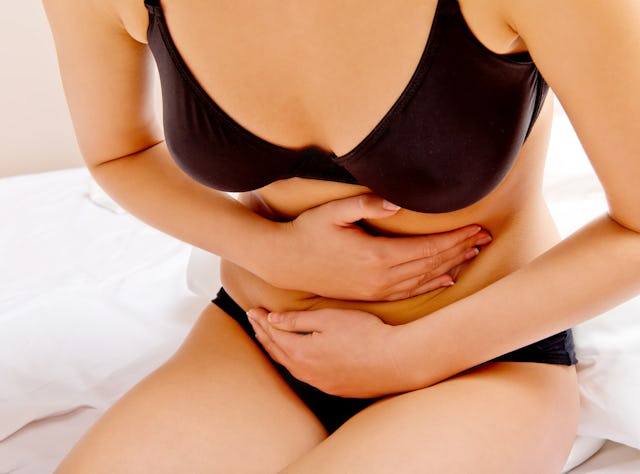Why Does My Stomach Hurt After Sex? 4 Possible Culprits To Consider, According To OB-GYNs
It’s worth checking out.

Sex is great (at least that’s the hope), but there can be a number of weird things you might experience post-coital. From bloating after sex to legs shaking, scary side effects can put a bit of a damper on all the sweaty goodness. One common but disconcerting feeling? Stomach pain after sex. It's one thing to feel a little gassy after the big O, but it's another thing entirely to feel abdominal pain. The good news is that it doesn't necessarily mean it's a medical emergency, but it's definitely something you should bring up with your doctor.
"Pain during sexual intercourse can range from feeling pain in the upper abdominal area to the pelvic area," says Dr. Alexandra Bausic, a board-certified OB-GYN. "In some cases, pelvic discomfort or dyspareunia (pain during sex) can signal a pelvic inflammatory disease, other gynecological condition, or no medical issue. Dyspareunia is a condition that can exacerbate the pain you feel during sex. If you have discomfort during sex frequently, consult a doctor to evaluate if there is an underlying problem."
That said, there are several possible explanations to consider the next time sex makes your stomach hurt.
Reasons Your Stomach Could Hurt After Sex
1. Pelvic Inflammatory Disease
"Pelvic inflammatory disease is a general term for a persistent inflammation of your reproductive system, which includes your uterus, cervix, ovaries, and tubes," says Bausic. "Chlamydia and gonorrhea are the most serious STIs that are the main causes of this condition. These infections can propagate and climb up to your intraperitoneal reproductive organs (ovaries, fallopian tubes) if you don't catch them early."
If you experience symptoms (i.e., pelvic pain, change in vaginal discharge, irregular periods), Bausic recommends getting tested for chlamydia and gonorrhea.
2. Endometriosis
"This is a chronic pelvic pain condition that causes pain, especially with intercourse, and occurs when endometrial glands from inside the uterus move outside the uterus and stick into surfaces they're not supposed to," says Dr. Greg Marchand, a board-certified OB-GYN. "In addition, endometriosis lesions can bleed during intercourse, and although this small amount of blood would not cause you to bleed to death, it can cause a great deal of pain in the lower abdomen and pelvis."
A gynecologist should treat endometriosis, according to Marchand, with treatments in some cases being as simple as low-dose hormonal birth control pills.
3. Pregnancy
"Pelvic pain is common during pregnancy, especially at the start, when your body is adjusting to its new situation, and by the third trimester, when both your baby and belly have grown large enough to push against your other organs," says Bausic. "Pelvic pain is distinct from uterine contractions, which are the uterus' reactions to the natural changes in your body that occur during pregnancy. Your abdominal and pelvic organs are being touched during sex; that's why discomfort can feel like pain. Also, because your uterus contracts during orgasm, pelvic pain is frequent after orgasm in pregnancy."
She recommends changing the angle of the penetration and the rhythm of the penetration to see if the pain subsides.
Additionally, pain during sex can be a sign of an early pregnancy, says Bausic, especially if you don't experience this regularly. "If this is the case, you can take a pregnancy test at home and go to the OB-GYN doctor for an ultrasound confirmation."
4. Uterine Fibroids or Ovarian Cysts
According to Marchand, pain in the upper abdomen (where the actual organ called the stomach is) should not be affected by intercourse. "This is a common place to experience pain from gastric ulcers and stomach viruses," he says.
This is why if you're experiencing "stomach pain," chances are you experiencing pelvic pain, including pain in the ovaries. He cites the following as common causes for ovarian pain: uterine fibroids (non-cancerous tumors of the uterus); ovarian cysts (fluid-filled sacs or pockets in an ovary or on its surface); ovarian tumors adenomyosis (a disease where the glands of the uterus invade the uterus's own muscle tissue, becoming inflamed and painful; or interstitial cystitis (a syndrome affecting the wall of the bladder where the bladder becomes painful).
"The ovaries can become painful for a number of reasons," says Marchand. "But without medical care, it's going to be impossible to tell if the pain is coming from your ovaries, uterus, or another organ."
Why You Should Seek Medical Attention
That's why both Bausic and Marchand recommend seeking medical attention if you're experiencing stomach pain after sex.
"An OB-GYN doctor can run a variety of medical tests to accurately identify your pelvic pain," says Bausic. "The Pap smear and vaginal discharge are the first exams, and they can reveal if you have a sexually transmitted or non-sexually transmitted vaginal infection. Your doctor will then perform an intravaginal ultrasound examination to visualize your reproductive organs and identify if you have any ovarian cysts or masses that could be the source of your pelvic pain."
Bausic says it's crucial to trust your doctor and tell them about your symptoms and what makes you feel uncomfortable. "Insist on describing your pelvic pain and other types of pain that bother you, especially the symptoms that are felt during sexual intercourse."
In the meantime, she recommends taking ibuprofen and drinking plenty of water to help alleviate the pain.
Expert Sources
Dr. Alexandra Bausic, board-certified OB-GYN
Dr. Greg Marchand, board-certified OB-GYN